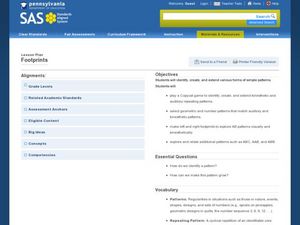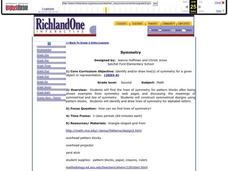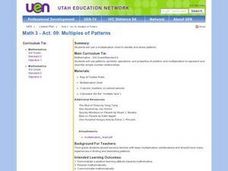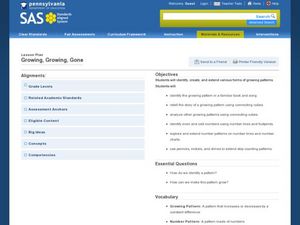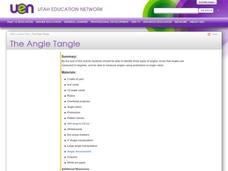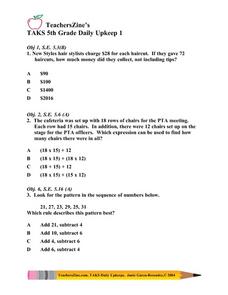Curated OER
All A-buzz About Math
Second graders participate in Math-Eze activities to comprehend word problems. In this word problem lesson, 2nd graders recognize why a hexagon is the best shape for a beehive. Students calculate how far bees must travel to find 2 lbs....
Curated OER
Data Analysis Using Technology
Analyze data using technology. Middle schoolers design data investigations, describe data, and draw their own conclusions. Then they select the best type of graph, graph and interpret the data, and look for patterns in trends. They also...
Curated OER
Patterns in Nature Booklet
Learners examine patterns on objects in nature, then use rubbings of these patterns to create pattern booklets.
Curated OER
Math Activity File
Third graders describe the difference between area and volume and also explain how various units of measure relate to one another.
Noyce Foundation
Tri-Triangles
Develop an understanding of algebraic sequences through an exploration of patterns. Five leveled problems target grade levels from elementary through high school. Each problem asks young mathematicians to recognize a geometric pattern....
Noyce Foundation
Miles of Tiles
Create number sentences and equations to solve geometric problems. Each activity in the series of five asks young mathematicians to consider different-sized tiles to build structures according to specific criteria. The first activities,...
World Wildlife Fund
Take 6
Investigate the various properties of the number six with this elementary math lesson. From simple addition, subtraction, multiplication, and division problems to the creation of hexagonal tessellations, this lesson covers all aspects of...
Curated OER
Footprints
Students explore patterns. In this patterns geometry lesson, students identify and extend patterns including body parts, movement, geometric shapes, noises, and footprints. Students create and share an original pattern.
Curated OER
Symmetry
Second graders find the lines of symmetry in pattern blocks and alphabet letters. In this symmetry lesson, 2nd graders discuss what symmetry is, view examples of lines of symmetry and apply what they have learned by finding the line of...
Curated OER
Geoboard Squares
Students create squares of different sizes on a geoboard. They find and describe a pattern. Students use the pattern to determine the number of squares possible on a 10-by-10 geoboard. They create squares with a horizontal base (and...
Curated OER
Rep Tiles
Third graders use pattern blocks of one shape at a time to try to create a similar shape. They compare the perimeter of the new figure with the perimeter of the original shape and look for a pattern. Students use the pattern to predict...
Curated OER
Measuring Math Vocabulary
Students go over math vocabulary words and show examples of the terms on the board. For this math vocabulary lesson plan, students go over many words and are given a worksheet with words and definitions.
Utah Education Network (UEN)
Multiples of Patterns
Elementary mathematicians identify and share patterns found in multiplication. Through memorization drills and games, they identify the increments in which numbers increase when multiplying. Using a multiplication chart, learners...
Curated OER
Geometry Patterns
Fifth graders, using graphic and word processing software, create geometric patterns by performing elementary transformations.
Curated OER
Math worksheets for Kids
In this math worksheet, there are lots of links for different types of math problems. There are patterns and counting, addition and subtraction. This site is geared towards elementary kids.
Curated OER
Growing, Growing, Gone
Budding mathematicians identify growing patterns in numbers and songs then create their own patterns. They look at number patterns and language patterns and then create their own using money and footprints.
Curated OER
Which Fish Where?
Here is a lesson outline that prompts elementary students to graph and analyze data regarding fish caught along the Hudson River. They will review vocabulary and complete 2 worksheets which can be accessed by clicking on the provided links.
Curated OER
Visualizing Multiplication
Upper graders represent multiplication of a two-digit number by a two-digit number as the area of a rectangle with dimensions of the two factors. They find patterns for the number of different base ten blocks in a rectangle representing...
Curated OER
Angles
Fourth and fifth graders investigate angles and name them according to the criteria for obtuse, acute, and right angles. They examine a human-made yarn pattern on the floor of their classroom and identify angles, vertices, and types of...
Curated OER
How using number patterns help us add or subtract
Second graders use a number line to understand multiples. In this number line lesson, 2nd graders use a floor size number line and calculate problems with multiples. Students complete a worksheet with multiples.
Curated OER
Math Sequencing Activities
Recognizing patterns and sequences in groups of numbers is an essential skill for all students to learn.
Curated OER
Ten Little Black Dots
Second graders use black and red construction paper to symbolize different one digit numbers that add up to 10. In this sums to 10 lesson plan, 2nd graders discover different combinations and patterns that can lead them to the number 10.
Curated OER
Linear Functions
Fifth graders investigate the concept of a function in relationship to how it is used. The concept is essential for the future study of Algebra. They apply the use of patterns with its relationship to functions.
Curated OER
TAKS 5th Grade Daily Upkeep 1
In this elementary math worksheet, 5th graders find the answers to the word problems in the multiple choice format for addition and multiplication.




